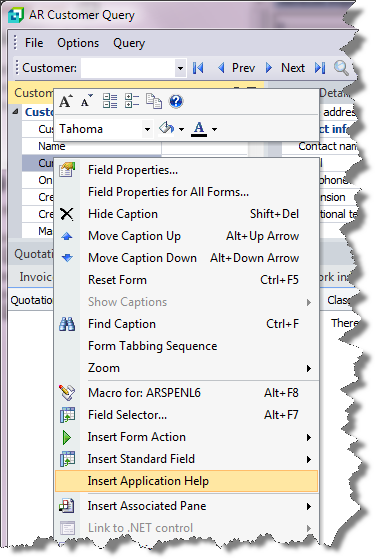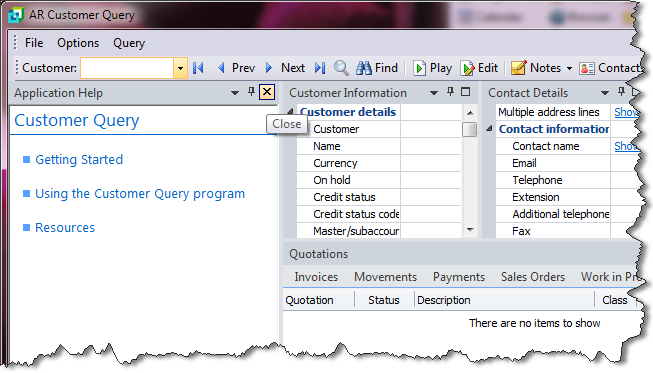You use this program to assemble a series of dispatch notes for consolidation into a single invoice.
| Field | Description |
|---|---|
| Start Processing |
Consolidates the dispatch notes you selected according to the criteria you specified. |
| Prints the information currently displayed in the Dispatch Note Consolidation output pane. | |
| Save Form Values | This option is only enabled in Design mode (see Automation Design). Your selections are saved and applied when the program is run in automated mode. |
| Field | Description | ||||||||
|---|---|---|---|---|---|---|---|---|---|
| Consolidation details | |||||||||
| Consolidation level selection | Indicate the level at which you want to consolidate
dispatch notes.
|
||||||||
| Consolidate by customer purchase order |
If you selected to consolidate dispatch notes at customer level, then you can include the customer's purchase order number as a criterion for the consolidation process. |
||||||||
| Warn if dispatch note is in use |
The system notifies you when you attempt to consolidate a dispatch note that is being maintained by another operator. You can either exclude the dispatch note from being consolidated, or retry until the dispatch note is no longer being maintained. |
||||||||
| Customer details | |||||||||
| Customer selection | Indicate the customer(s) you want to include in the consolidation process. | ||||||||
| Order details | |||||||||
| Sales order selection | Indicate the sales order(s) you want to include in the consolidation process. | ||||||||
| Dispatch note details | |||||||||
| Dispatch note selection | Indicate the dispatch notes you want to include in the consolidation process. | ||||||||
| List of dispatch notes |
Enter a list of dispatch note numbers which you want to include in the consolidation. |
||||||||
| Dispatch date details | |||||||||
| Dispatch date selection | Indicate the dispatch date(s) according to which you
want to consolidate dispatch notes. The dispatch date is the actual date of delivery. This is the date when the dispatch note was printed (which would be the system date at the time the dispatch was created if it was printed at the same time). |
||||||||
| Ship to address details | |||||||||
| Ship to address selection |
Indicate the ship address to associate with the consolidated dispatch invoice. When consolidating dispatches for the same destination into a single invoice, the destination address needs to be printed on the invoice to facilitate payment.
|
||||||||
| After processing completed | These options are displayed within programs that can be automated. They enable you to indicate the action you want to perform once processing is complete (see Automation Design). |
-
You cannot process invoices if the Inventory module is in an earlier period than the Accounts Receivable module, or the current period of the Inventory and Accounts Receivable modules differ by more than one month.
-
Dispatch notes can only be consolidated if they have been printed (i.e. they are in a status of 7). Once consolidated, these dispatch notes are moved to a status of 8.
In addition, consolidation occurs only if all the following details are the same for each dispatch note selected:
- Branch
- Geographic area
- Salesperson
- Nationality code
- Tax type
- Terms code
- Extended tax code
- Delivery terms
- Nature of transaction code (if EC VAT system applies)
-
Dispatch notes created from Supply Chain Transfers (SCTs) cannot be consolidated.
-
You cannot cancel a consolidated invoice once dispatch notes have been consolidated.
For example, if you have four dispatch notes and you use the Dispatch Note Consolidation program to consolidate them, then one invoice number is allocated to the sales order(s) which represents these dispatch notes. If you incorrectly consolidated one dispatch note, you need to print the consolidated dispatch invoice and then process a credit note. You cannot cancel the dispatch invoice.
-
Once consolidated, the dispatch invoice can only be printed in batch mode using the Document Print program.
-
If a kit is split over a number of dispatches, then they are invoiced separately (i..e the kit parent and its components are not actually consolidated).
For example:
You create a sales order for a kit item with two lines, putting one line in ship and the other on backorder.
Dispatch the line in ship.
Move the second line from backorder to ship and dispatch the line.
When you consolidate the dispatches, two invoices are created.
-
Dispatch notes for sales orders that were captured at a fixed exchange rate are ignored from the consolidation process. To include these dispatch notes you must select to consolidate them at sales order level.
If you captured a number of sales orders for a customer using different fixed exchange rates, then separate invoices are created for each exchange rate used.
-
A dispatch note is always invoiced at the ruling sales order price at the time the dispatch invoice is created (i.e. the price is fixed by the current order price) regardless of whether the dispatch note is part of a consolidated dispatch invoice.
-
Order discounts are applied to a consolidated dispatch invoice only if the consolidation is for a single order. Where the consolidation includes a number of orders, the discount is set to zero.
-
The next invoice number by company or branch is allocated to the consolidated dispatch invoice according to the numbering method defined within your Accounts Receivable Setup options.
-
All sales invoices created within a single SYSPRO company must have a unique number unless you enabled the Allow same number for different customers setup option (Sales Order Setup). This applies regardless of the order and invoice numbering methods selected,
-
If you are consolidating dispatch notes to produce a single invoice, then the customer form data against each individual dispatch note cannot be printed on the invoice (i.e. custom form data can only be printed on a dispatch invoice if the invoice is being created for a single dispatch note).
Inserting Application Help
You would typically follow this procedure to display help for the current program in a customized pane that can be pinned to the program window.
Information includes step-by-step instructions for the various functions available within the program, including a brief overview of what the program does, what setup options are required and how to personalize the program.
-
Open the program for which you want to insert application help into a customized pane.
This functionality is only available for a program that has panes.
-
Right-click any form field.
You can also click the triangle menu icon that appears in the title area of a pane.
-
Select Insert Application Help from the context-sensitive menu.
The application help appears in a pane within your program. You can reposition the pane using the docking stickers or pin it to the program window.
Removing the Application Help pane
If you no longer want to display application help in a pane for your current program, you can simply remove it.
-
Select the Close icon in the right-hand corner of the application help pane.
-
Confirm that you want to delete the pane.

